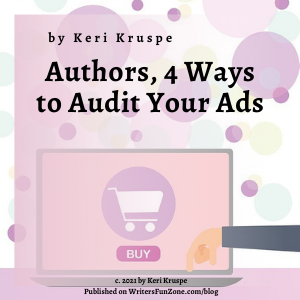Authors, 4 Ways to Audit Your Ads by Keri Kruspe
 Let’s welcome back monthly columnist Keri Kruspe as she shares with us “Authors, 4 Ways to Audit Your Ads.” Enjoy!
Let’s welcome back monthly columnist Keri Kruspe as she shares with us “Authors, 4 Ways to Audit Your Ads.” Enjoy!
***
Okay, you’ve gotten yourself ready to advertise your literary masterpiece and you took the plunge into the advertising pool.
What’s next?
Now you’ve got to determine if you’re spending good money to make good money.
The best way to do that is to audit your advertising.
- What you do,
- how you do it
- and most of all, how much you spend on it.
Before we delve into what to audit, let’s take a quick peek at some variables first.
Like what you can and what you can’t control.
Audit Your Ads: Recognize what you can’t control
 As with a lot of things in life, there are variables in publishing we have no control over.
As with a lot of things in life, there are variables in publishing we have no control over.
Even as “indie” publishers, we’re at the mercy of ad platforms and their algorithms (which are defined as a process or set of rules to be followed in calculations or other problem-solving operations, especially by a computer.) [Editor’s Note: Computer rules that humans programmed.]
We’re susceptible to market conditions that are created by other authors as well as readers. And those readers’ taste changes all the time.
So do the variances in market price dynamics as well as genre standards that switch.
At the end of the day, it means our advertising efforts can be unpredictable.
Here are some things as an author you have no control over:
- Ad platforms
- Facebook Algorithm
- Amazon Ads Algorithm
- Seasonality
- Advertising Rules
- Market Prices/CPC’s (CPC = Click per customer)
- Other Authors
- Trope Competition
- Category Competition
- Readers
- Reader Affordability
- Reader Tastes
- Retailers
- Viability
- Business Models
- Bans/Blocks
- Rankings
When You Audit Your Ads, Realize what you do have control over
Never fear, there are things we have control of.
 So, in no particular order, here are some things I believe we can control as writers:
So, in no particular order, here are some things I believe we can control as writers:
- Fan Strategy
- Fan events
- Release Strategy
- Go from standalones to series
- Release books faster
- Your Genres/Tropes
- Write to market
- Advertising Strategy
- Try different channels
- Or, optimize differently across channels
- Email Campaigns
- Grow your list – or – stop if this is something you hate
- Strategic alliances
- Partner with other authors
- Social Media
- Try more social channels – or – stop and spend more time on other things
- Your Product
- Covers, blurbs, pricing, reviews
- Your Author Brand
- How visible you are that showcases your personality
See…?
Congrats… we have more to control than what’s out of our control!
But the main thing I want to emphasize is you don’t have to do them all!
That’s where I got stuck when I first started. I spread myself thin by trying everything all at the same time.
Auditing Your Ads: Okay, I have control. Now what?
Before I delve into how to audit your ads, let’s first “audit” ourselves.
Or, a better way to put it, let’s change our attitude about the whole thing.
If you’re not using a professional advertiser (don’t I wish…), the advertising manager for your business is you.
It all comes down to how you organize and spend your money.
I’ve either read or heard in training (over and over) that to maximize your advertising dollar, you have to test the ads you put out, no matter what platform you used to optimize your ads.
When I first heard this, it sounded like finding the right way to advertise was to fail.
Failing at anything is hard, but I guess it’s the only way to determine what works and what doesn’t.
For me, that meant I needed an attitude adjustment.
Instead of whining about my failures, I had to consider that my failures were a way for me to find out what works and what doesn’t.
I think it was Edison who said:
“I have not failed. I’ve just found 10,000 ways that won’t work.”
Let’s take his example and use it to our advantage.
Instead of considering what I’ve tried as a failure, I’ve learned what didn’t work.
That’s the trick, to learn from your “failures.”
So, every time a marketing campaign “doesn’t work,” it’s time to analyze the criteria used.
To think critically on what doesn’t work or doesn’t work for our brand.
Right now I’m currently running five different ads on Amazon for one book.
They all have the same ad verbiage, but I’ve targeted different categories or keywords.
One of them isn’t generating any impressions or clicks, while another has over 2400 impressions in the same time frame.
So, instead of feeling like it was a failure, I now know something that doesn’t work. And a good possibility that something does.
So, instead of thinking like example #1…
#1. Darn, I lost $10 whole dollars to learn that not a single fan of XXX author is willing to buy my books. ☹
Insert Change of Attitude…
#2. For the modest sum of $10, I found out that XXX author fans who hang out on BookBub aren’t my base! 😊 Now I can move on to another promising author…
In Auditing Your Ads: Test, Analyze Your Failures and Your Successes
 When I first started out, I admit I spent way too much money with little to show for it.
When I first started out, I admit I spent way too much money with little to show for it.
I would look at my ads half-assed and not delve into them as to why they didn’t work.
It wasn’t until I realized I should be testing my ads against each other at the same time.
To be honest, I’m only now brave enough to up my game and do some aggressive ads without breaking the bank.
I now narrow my focus to only one specific platform at a time.
I admit I’ve just started that this year and I’m taking baby steps. But at least now I’m not overspending more than I bring in.
But what if it feels like nothing is working?
As promised, here are four ways to audit your ads:
- Low impressions might mean low targets; find a larger target audience.
- Low CTR’s means the ad needs work (visual? ad copy?). (CTR = Click Through Rate)
- Low conversion rates could mean that the retail pages need work.
- Low sell-through means the book needs work. (Needs reviews? Change cover/blurb?)
As an added suggestion, think creatively about how to get the insights you want:
- Approach experiments from the perspective of specific questions you want answered.
- If the results of different experiments feel the same, create more contrast.
One last word about failures.
Know if a failure is really a failure.
The example below puts you in the same place even though one looks more “successful” than the other:
- 2 clicks on an ad w/100 impressions = 2% conversion rate
- 20 clicks on an ad w/1,000 impressions = 2% conversion rate
 If nothing else, use the simple premise that as long as you are showing a profit, your ads are working!
If nothing else, use the simple premise that as long as you are showing a profit, your ads are working!
Most of all, as you work through this… don’t quit!
Don’t give up until you truly understand what you’ve learned.
Just know you aren’t alone.
My goal is to be a successful author (i.e. quitting my day job) and making great ads is something I struggle with every darn day… but I persist.
***
Want to read more articles like this one Writer’s Fun Zone? Subscribe here.
***
ABOUT THE AUTHOR
Keri Kruspe has been an author since the age of twelve and has always been fascinated with otherworldly stories that end in Happily Ever After. Author of Otherworldly Romantic Adventures, Keri’s first series is An Alien Exchange trilogy. An Alien Exchange is the first book in the arousing Alien Exchange sci-fi romance series. If you like sexy aliens, feisty heroines, and fast-paced action, then you’ll love Keri Kruspe’s steamy space adventure.
has been an author since the age of twelve and has always been fascinated with otherworldly stories that end in Happily Ever After. Author of Otherworldly Romantic Adventures, Keri’s first series is An Alien Exchange trilogy. An Alien Exchange is the first book in the arousing Alien Exchange sci-fi romance series. If you like sexy aliens, feisty heroines, and fast-paced action, then you’ll love Keri Kruspe’s steamy space adventure.
Keri now resides with her family in the wilds of Northwestern Michigan. An avid reader, Keri enjoys good wine, good food, and watching action/adventure movies. You can find her most days immersed in her fantasy world of writing or traveling with her hubby in their RV, discovering intelligent life here on Earth. For goodies, news of upcoming releases, sign up for her newsletter at www.kerikruspe.com.






